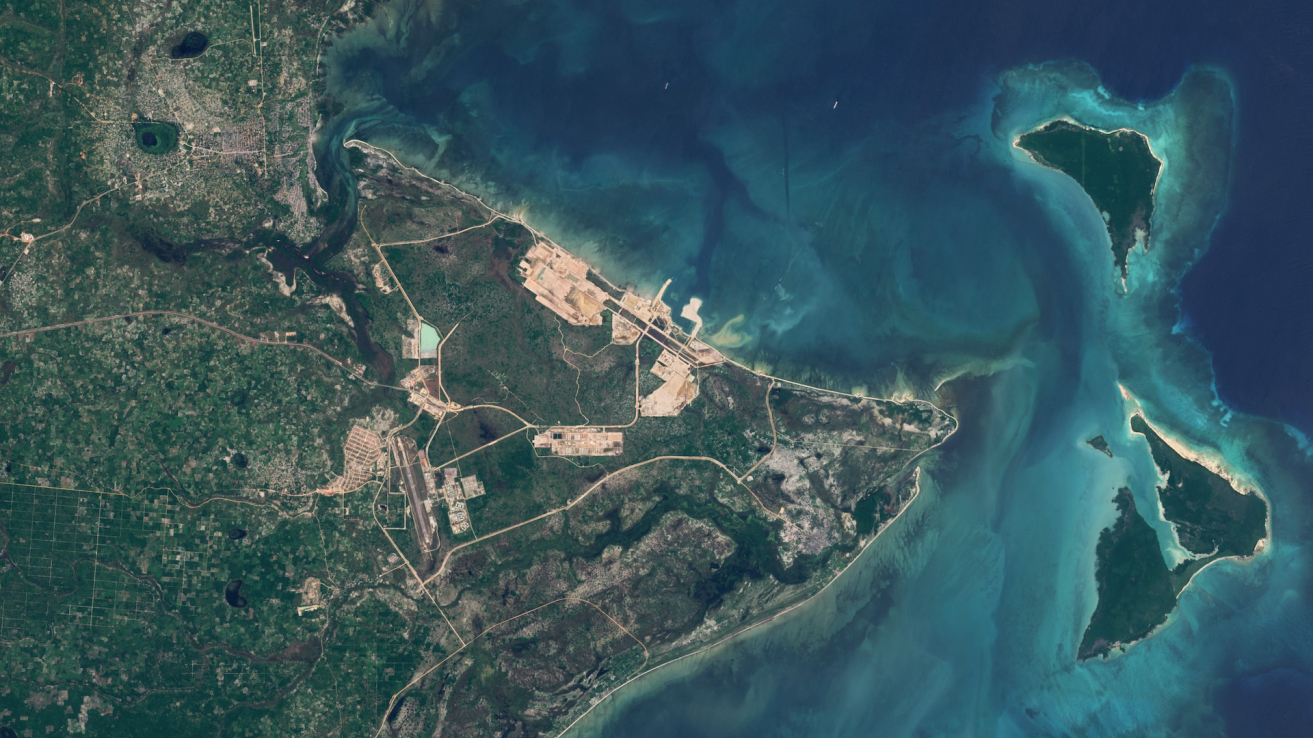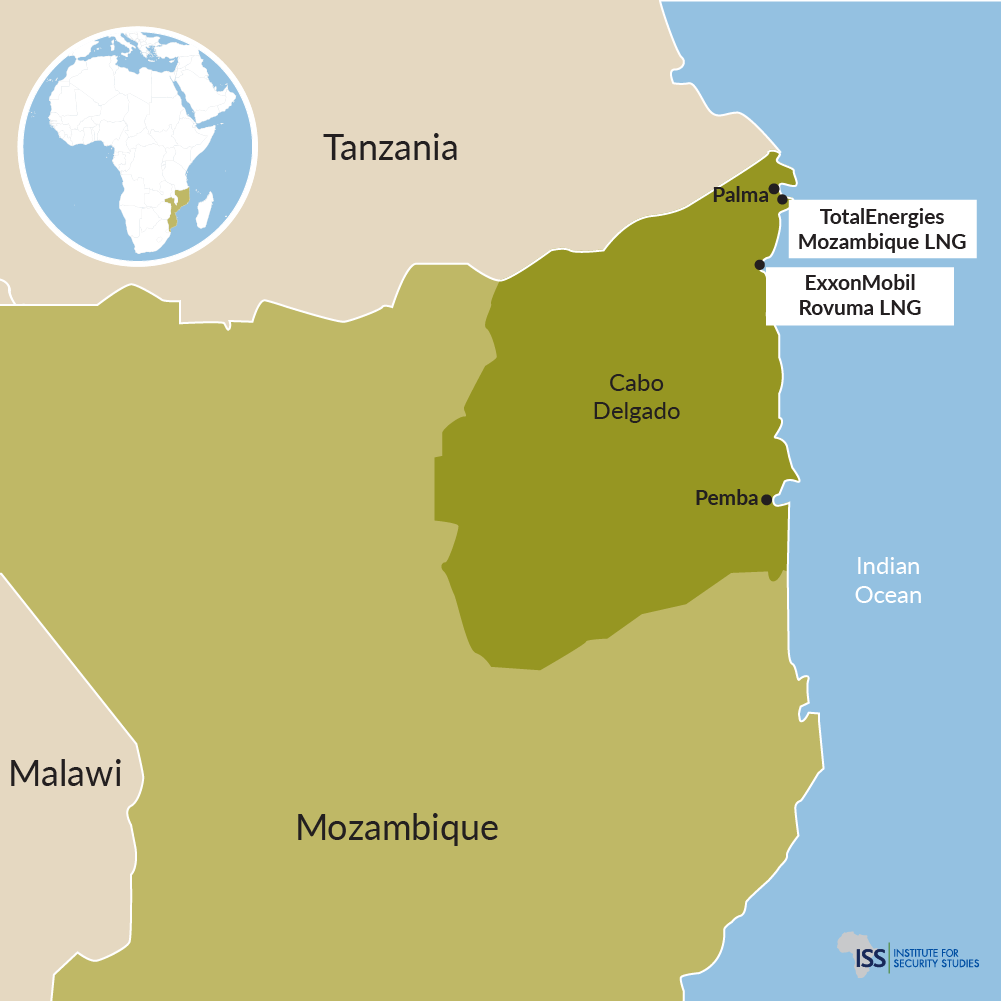Terrorism takes its toll on Mozambique’s gas revenue
TotalEnergies’ return to Cabo Delgado will cost an extra US$4.5 billion – reflecting the price of terrorism and poor resource governance.
Published on 10 November 2025 in
ISS Today
By
The decision by TotalEnergies to lift the force majeure on its Mozambique liquified natural gas (LNG) project marks the long-awaited restart of gas operations in Cabo Delgado. But the project’s four-and-a-half-year suspension due to the ongoing insurgency has added an extra US$4.5 billion to the costs. Terrorism has plagued the region since 2017, a few years after the discovery of its vast gas reserves.
Chief Executive Officer Patrick Pouyanné communicated the company’s position to Mozambique’s President Daniel Chapo in a letter dated 24 October 2025. TotalEnergies insists these costs be recognised as part of the investment, which would significantly reduce the project’s profits and the country’s tax income. The letter does not say how the US$4.5 billion was spent while the project was halted.
This could be the first of many bills related to the insurgency that Mozambique has to cover. The government has not yet reached an agreement with TotalEnergies regarding the additional costs; Chapo says negotiations between the two parties will now start.
What is clear is that gas exploration has become more expensive since the terrorism outbreak. Until the government finds a sustainable solution to the conflict, the risk of rising costs will remain high. Companies operating in conflict environments incur increased security expenses for their assets and staff, which are recorded as investment costs and are deductible from both revenues and taxes payable to the government.
While there is no consensus on what exactly started the insurgency, the violence is linked to the discovery and beginning of gas exploration projects in Cabo Delgado. Several studies show that local communities did not benefit from job opportunities due to a lack of professional skills demanded by the projects.
At the same time, the government expropriated community land to allocate to gas companies. Communities’ access to the sea for fishing was also restricted, cutting off their primary sources of livelihood in what are predominantly rural and fishing areas. These factors contributed to the radicalisation of local populations, who later joined the terror groups.
Furthermore, instead of addressing the insurgency’s root causes and aggravating factors, the government deployed military and police contingents and hired foreign private military companies to counter the violence. The authorities should have addressed poverty, inequality, lack of access to the benefits of natural resources by local populations, and ethno-religious disputes, among other issues.
In many cases, residents were harassed or abused by the security forces, accused of collaborating with the insurgents, who themselves are mainly local. Rather than containing the instability, this approach added fuel to the fire, leading to the spread of intensified attacks to more areas.
After successive years of failed government responses, in March 2024 insurgents attacked the town of Palma, located about 10 km from the LNG site operated by TotalEnergies. The attack forced the declaration of force majeure and the suspension of the plant’s construction activities.
|
Two LNG sites, Cabo Delgado, Mozambique
|
The government is now a victim of its own decisions. When the conflict began in the resource-rich area, the state proceeded with gas exploration projects, creating mechanisms to protect corporate assets while disregarding the needs of nearby communities. This US$4.5 billion bill is the price Mozambique must pay for poor resource governance and for prioritising the protection of its resources over its people.
After TotalEnergies’ withdrawal, the government relied on foreign troops from Rwanda and the Southern African Development Community (SADC) to try to contain the violence. Still, it took almost five years for TotalEnergies to resume construction on the plant.
In addition to the steep extra costs, the company is demanding a 10-year extension of its exploration and production contract in the Rovuma Basin to compensate for the period of suspension.
Mozambique has shown little enthusiasm for the conditions imposed by TotalEnergies to restart the project, as they would entail significant revenue losses for the state. And extending the concession period by 10 years means Mozambique would have to wait much longer before the project is transferred to its ownership.
The gas exploration contract between the government and TotalEnergies follows a BOOT model – build, own, operate, transfer. This means that at the end of the concession period, the asset reverts to the state, or a new contract must be negotiated for an extension, subject to additional payments by the operator.
Although an agreement has yet to be reached between the parties, it appears likely that TotalEnergies will soon resume work on the project. However, violent conflict in the region persists. TotalEnergies is therefore expected to operate in a ‘green zone’ model – isolated from local communities – offering even fewer benefits to the surrounding population. This may fuel frustration among locals, further feeding the insurgency.
Another gas project, Rovuma LNG operated by ExxonMobil, is preparing to announce its final investment decision, estimated at around US$30 billion. Like the TotalEnergies project, this is an onshore venture that will likely face similar security challenges.
Although the insurgents currently show little capacity to directly attack the gas facilities, as long as the conflict endures, the projects will remain under threat – and so will government gas revenue.
To maximise gas gains for the state and extend their benefits to local communities, Mozambique’s government must adopt alternative conflict-resolution approaches beyond the military route, which has proven ineffective on its own. Investing in programmes that prevent and counter violent extremism and promote dialogue are key steps towards sustainable peace.
Exclusive rights to re-publish ISS Today articles have been given to Daily Maverick in South Africa and Premium Times in Nigeria. For media based outside South Africa and Nigeria that want to re-publish articles, or for queries about our re-publishing policy, email us.

